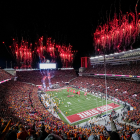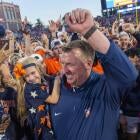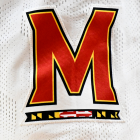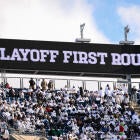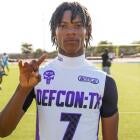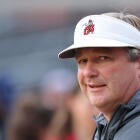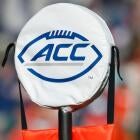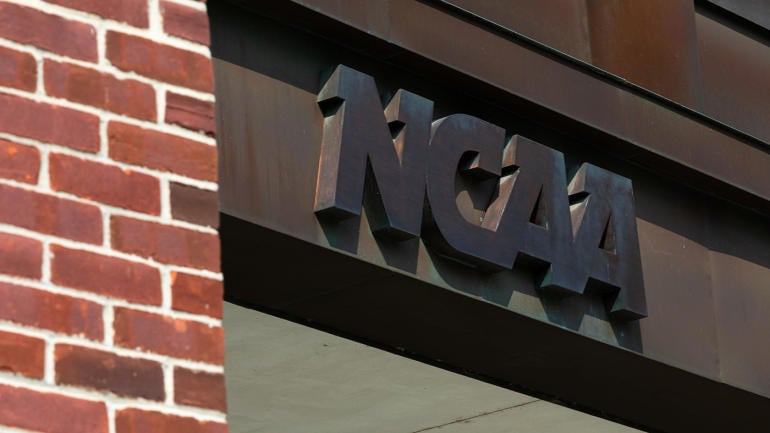
The NCAA Division I Council approved a series of measures during its two-day meeting this week to address the evolving landscape of issues in college athletics. Most notably, the body voted Wednesday to shorten transfer portal windows from 60 to 45 days for all sports, starting with the 2023-24 academic year.
Additionally, the voting group strengthened sanctions for coaches who have committed rules violations and announced what it termed new "protections" for athletes in the name, image and likeness (NIL) space. The council also announced its recommendation for a reexamination of reinstatement guidelines for athletes caught betting on sports.
The council is comprised mostly of athletic directors, conference commissioners, faculty representatives and student-athletes from across the Division I landscape. It is a group that includes the likes of SEC commissioner, Greg Sankey as well as Clara Vulpisi, a women's water polo goalkeeper for Pacific University.
A total of 40 representatives make up the committee with all 32 Division I conferences represented in some regard. The group is currently chaired by Florida deputy athletic director Lynda Tealer. Here are the highlights of what the group enacted this week.
Reduced transfer windows
Instead of 45 days after the conclusion of the regular season — defined as the day after the College Football Playoff and bowl participants are announced — there will now be 30 days for Division I football players to enter their name in the transfer portal. The spring transfer portal window, open for 15 days in April, is expected to remain the same.
Initial proposals sought to reduce the transfer portal windows from 60 days all the way down to 30, but the 45-day format provides an opportunity for college football players to assess their current position and the status of the coaching carousel throughout the month of December.
Coaches have complained about the stresses of managing the transfer portal alongside the early signing period for high school recruiting, but there is also the shifting of coaches -- especially assistants -- that occurs throughout December. Giving players 30 days after the season allows for some of that movement to settle as they consider their immediate future with their current program.
Gambling penalties
The Division I Council voted to direct two other committees to examine guidelines for athletes caught gambling. Those other two committees -- the Division I Committee on Student-Athlete Reinstatement and Legislative Committee -- will review penalties for those athletes caught gambling on games not involving their own teams.
Among the draft concepts under consideration are:
- On a first offense, eliminate penalties that result in student-athletes being withheld from competition -- regardless of the dollar value of the wagers and including bets placed on other sports at a student-athlete's school -- and require education on sports wagering rules and prevention.
- On a second offense, potentially involve withholding penalties, depending on the dollar value of the bet(s) in question.
- On a third or subsequent offense, resulting penalty could be a loss of one full season of eligibility.
"We continue to put student-athlete well-being front and center in the Association's efforts around sports wagering, including this week's action related to reconsideration of penalties that members believe have been overly punitive to student-athletes," NCAA President Charlie Baker said. "This is an important step toward modernizing the NCAA's approach to sports wagering.
However, the Division I Council "reaffirmed" that significant penalties will remain in place for wagering that could impact the integrity of games. I.E. athletes caught gambling on their own teams will continue to face stiff penalties.
Lobbying for player protections
Related to the gambling issue, the NCAA announced it will advocate for updates to state sports gambling laws that "protect student-athletes from harassment or coercion, address the negative impacts of problem gambling and protect the integrity of NCAA competition."
Among the measures the NCAA will push for in state laws are mandatory reporting hotlines for "harassment or coercive behavior." The NCAA will also push for any sports gambling advertisements to include information about the harassment hotline and will advocate that a portion of sports betting revenue be directed toward education "to support the higher-risk college student population, including student-athletes."
Potential NIL protections
Also approved in unanimous fashion were a series of measures surrounding NIL that "could be adopted in January," according to the NCAA. Among them were:
Registration: Voluntary registration of NIL service providers such as agents, financial advisors and "others who support college athletes in NIL arrangements." Athletes could then access a "centralized registry" with information on those provided services in the NIL space.
Disclosure and transparency: For NIL agreements exceeding a certain monetary value, athletes would be required to report certain information to their school.
Other: Concepts surrounding standardized NIL contract terms and athlete education were also approved for further consideration.
Other action
As reported by CBS Sports on Tuesday, the NCAA also voted to strengthen infractions penalties, particularly those involving coaches.
Below is a full list of the proposals put forth by the Division I council:
- Publicly naming individuals involved in infractions and creating a public database to identify coaches with more severe violations.
- Expanding coaching suspensions to include the days between games.
- Expanding disassociation penalties for boosters that engage in rules violations.
- Attaching penalties for schools that hire individuals during a show-cause order.
![[object Object] Logo](https://sportshub.cbsistatic.com/i/2020/04/22/e9ceb731-8b3f-4c60-98fe-090ab66a2997/screen-shot-2020-04-22-at-11-04-56-am.png)










